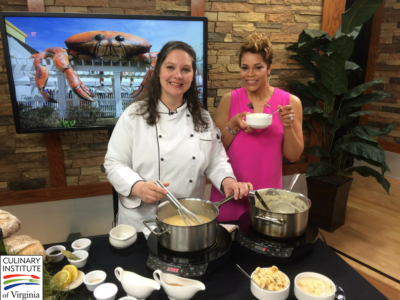The Grillmaster: Grilling and BBQ Tips for the Home Chef
Does anything say summertime better than good weather, good friends, and great BBQ? There’s nothing like the flavor of ribs or burgers prepared on a grill. Thanks to the array of sophisticated indoor grills on the market, you can enjoy meals on the BBQ any time of the year, but there’s just something about cooking out in the fresh air and sunshine.
BBQ professionals and champs agree that the secret to great grilling lies with the person, not the equipment. Channel your inner Bobby Flay and learn how to best cook on the grill with these grilling tips.
Prep Tips for Grilling
Great ingredients deserve proper prep! Here are some preparation tips for everything from meat to fruit!
- Marinades add delicious flavor while also preventing formation of HCAs, which are dangerous chemical compounds that can form on well-done or crusted meats. Some experts recommend allowing meat to marinate overnight, while others suggest no more than three hours to avoid compromising the texture.
- Wet and dry rubs are another way to incorporate a variety of flavors. Apply with a light hand to keep from over-seasoning and damaging the meat’s fibers.
- Grilling is not just for proteins. It does amazing things for fruit and vegetables as well. Asparagus, onions, zucchini, bell peppers, pineapple, peaches, watermelon, and bananas are excellent choices.
- Add hardwood chips or briquettes to achieve that smoky BBQ goodness. Experiment with different types of wood, such as mesquite for a sharp tang or hickory for a bacon-like richness.
- Preheat the grill 15 to 25 minutes ahead of cook time. If your grill doesn’t have a thermometer, simply hold your hand five to six inches over the grate and time how long you can keep it there. Figure two seconds for high heat, four for medium, and six for low.
- The proper heat level adds that beautiful sear and prevents food from sticking. You can also soak a paper towel in cooking oil and rub it over the grate.
- Once the grill has preheated, use a wire brush to remove food particles and other debris. If you’re in a pinch, crumble a piece of aluminum foil into a ball and place it an a pair of locking tongs.

Grilling Tips
Grilling is an art and becoming an elite grillmaster means thinking ahead.
- Tired of trying to rescue food that has fallen through the grate? Use a grill basket for smaller foods and items like fish and tofu that are awkward to turn.
- Flare-ups are not as impressive as they look. Flames can cause uneven cooking and an unpleasant taste. Remove any excess fat and skin from meat and poultry and have a spray bottle of water on hand to tame the flames.
- Two of the biggest mistakes made by grillers are piercing steaks with a fork and pressing burgers down with a spatula. Both actions release the meat’s natural juices and result in dry, less flavorful food. Use tongs and flip meat only once, and keep burgers from puffing up by making a small indentation with a spoon before cooking.
- Have you ever heard the mantra of the pros, “Low and slow?” Grilling ribs for several hours over low heat is the best way to obtain tender, juicy meat.
- Maintain a small area on the grill without direct heat. This gives you a buffer to rotate foods and perform an emergency evacuation if something is in danger of burning.
- Glazes and sauces can burn quickly due to the sugar content, so apply them during the last 15 to 20 minutes of grilling.
- When in doubt, err on the side of undercooking. You can always put food back on the grill if necessary, but when it’s overdone there’s no coming back.
- Probably the most important step in grilling meat is giving it a rest. This gives it a chance to reabsorb juices

Safety Precautions for Grilling
- Don’t leave uncooked meat at room temperature for more than one hour.
- Use separate cutting boards and platters for different types of meat and seafood to avoid cross-contamination. Always wash your hands after handling raw proteins.
- Never place cooked meat back into the same vehicle used to marinate it. The raw meat juices that remain can cross-contaminate the food.
Whether you’re a novice cook who wants to learn the basics or a skilled cook looking to expand your repertoire, meet your goals with courses at Casual Gourmet from Culinary Institute of Virginia.
Great lesson last night! Food for ThoughtPrinciples of cooking with Heat with Chef Douglas Cooperman
Posted by Princess Lipscomb on Wednesday, September 16, 2015
DISCLAIMER – Casual Gourmet makes no claim, warranty, or guarantee as to actual outcomes for past or current attendees. The Casual Gourmet website is published for informational purposes only. Every effort is made to ensure the accuracy of information contained on the CasualGourmet.com domain; however, no warranty of accuracy is made. No contractual rights, either expressed or implied, are created by its content.




